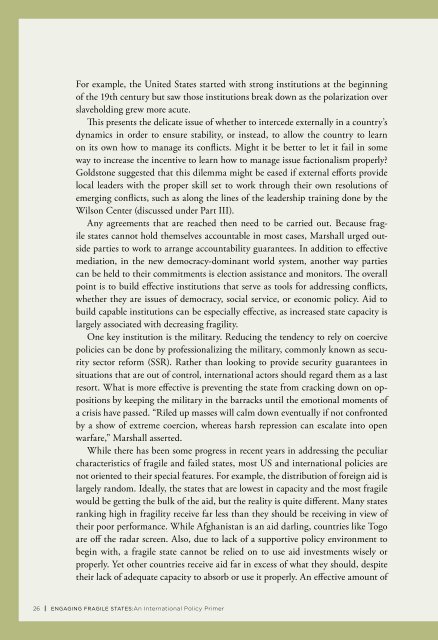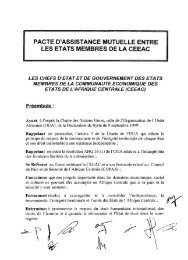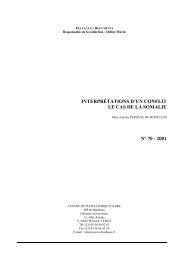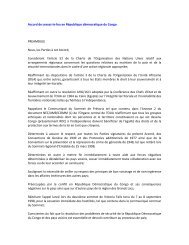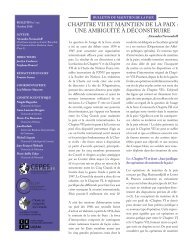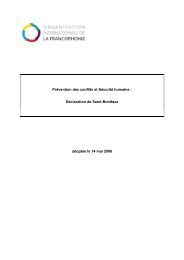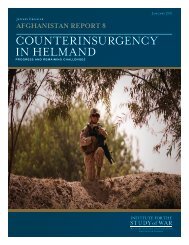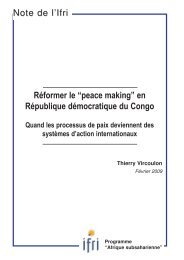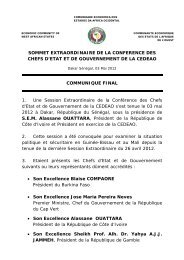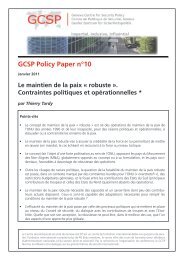engaging fragile states - Woodrow Wilson International Center for ...
engaging fragile states - Woodrow Wilson International Center for ...
engaging fragile states - Woodrow Wilson International Center for ...
You also want an ePaper? Increase the reach of your titles
YUMPU automatically turns print PDFs into web optimized ePapers that Google loves.
For example, the United States started with strong institutions at the beginning<br />
of the 19th century but saw those institutions break down as the polarization over<br />
slaveholding grew more acute.<br />
This presents the delicate issue of whether to intercede externally in a country’s<br />
dynamics in order to ensure stability, or instead, to allow the country to learn<br />
on its own how to manage its conflicts. Might it be better to let it fail in some<br />
way to increase the incentive to learn how to manage issue factionalism properly?<br />
Goldstone suggested that this dilemma might be eased if external ef<strong>for</strong>ts provide<br />
local leaders with the proper skill set to work through their own resolutions of<br />
emerging conflicts, such as along the lines of the leadership training done by the<br />
<strong>Wilson</strong> <strong>Center</strong> (discussed under Part III).<br />
Any agreements that are reached then need to be carried out. Because <strong>fragile</strong><br />
<strong>states</strong> cannot hold themselves accountable in most cases, Marshall urged outside<br />
parties to work to arrange accountability guarantees. In addition to effective<br />
mediation, in the new democracy-dominant world system, another way parties<br />
can be held to their commitments is election assistance and monitors. The overall<br />
point is to build effective institutions that serve as tools <strong>for</strong> addressing conflicts,<br />
whether they are issues of democracy, social service, or economic policy. Aid to<br />
build capable institutions can be especially effective, as increased state capacity is<br />
largely associated with decreasing fragility.<br />
One key institution is the military. Reducing the tendency to rely on coercive<br />
policies can be done by professionalizing the military, commonly known as security<br />
sector re<strong>for</strong>m (SSR). Rather than looking to provide security guarantees in<br />
situations that are out of control, international actors should regard them as a last<br />
resort. What is more effective is preventing the state from cracking down on oppositions<br />
by keeping the military in the barracks until the emotional moments of<br />
a crisis have passed. “Riled up masses will calm down eventually if not confronted<br />
by a show of extreme coercion, whereas harsh repression can escalate into open<br />
warfare,” Marshall asserted.<br />
While there has been some progress in recent years in addressing the peculiar<br />
characteristics of <strong>fragile</strong> and failed <strong>states</strong>, most US and international policies are<br />
not oriented to their special features. For example, the distribution of <strong>for</strong>eign aid is<br />
largely random. Ideally, the <strong>states</strong> that are lowest in capacity and the most <strong>fragile</strong><br />
would be getting the bulk of the aid, but the reality is quite different. Many <strong>states</strong><br />
ranking high in fragility receive far less than they should be receiving in view of<br />
their poor per<strong>for</strong>mance. While Afghanistan is an aid darling, countries like Togo<br />
are off the radar screen. Also, due to lack of a supportive policy environment to<br />
begin with, a <strong>fragile</strong> state cannot be relied on to use aid investments wisely or<br />
properly. Yet other countries receive aid far in excess of what they should, despite<br />
their lack of adequate capacity to absorb or use it properly. An effective amount of<br />
26 | Engaging Fragile States:An <strong>International</strong> Policy Primer


